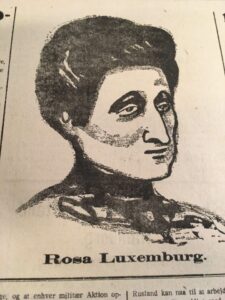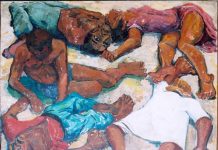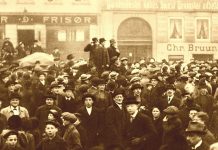Indhold
- Forord
- Vigtigste værker på dansk (online)
- Leksikalt
- Artikler og værker online, af/om RL
- Litteratur på skandinaviske sprog
- In English
- Se også
- Film/video
Forord
Den tyske revolutionære Rosa Luxemburg fødes 5. marts 1871 i Zamość (nuværende østlige Polen, ved Lublin, dengang det russiske zarrige).
Hun blev myrdet i Berlin af kontrarevolutionære frikorps under socialdemokratisk ledelse 15. januar 1919.
Luxemburgs første farverige år med forbudt socialistisk aktivitet, eksil, akademiske år og parforhold adskiller sig næppe fra mange (kvindelige) emigranters historie. Det er i de to årtier efter århundreskiftet, at hendes særlige historiske rolle slår igennem:
Som kritisk og teoretisk skarp venstrefløj i verdens største og vigtigste arbejderbevægelse og socialdemokrati, det tyske, og som analytiker og polemiker over for også den polske og russiske arbejderbevægelse, – som et direkte modstykke til det tyske socialdemokrati SPD’s nederlag over for den imperialistiske (Første) Verdenskrig – og endelig som en vægtig stemme i det revolutionære opsving i de sidste krigsår og i den teoretiske og organisatoriske dannelse af de vest-europæiske kommunistpartier (se om emner, samtidige personer og udgivelser i vores Se-også-links nedenfor).
Jørgen Lund & Bjarne A. Frandsen
Påbegyndt november 2010.
Luxemburgs vigtigste værker på dansk (online)
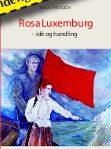
- 1899: Socialreform eller revolution
- 1905: Det russiske socialdemokratis organisationsspørgsmål
- 1906: Massestrejke, parti og fagforeninger
- 1915: Socialdemokratiets krise (= Junius-brochure) (kun udkast/teserne hertil er online og på dansk), men er online på svensk
- 1918: Den russiske revolution
***
Klassikeren om Luxemburgs liv er Paul Frölichs Rosa Luxemburg: Gedanke und Tat. Bogen blev i november 2010 udgivet i en dansk oversat og gennemarbejdet udgave af Stig Hegn: Rosa Luxemburg – idé og handling, af Forlaget Solidaritet (512 sider).
Anmeldelser:
En klassiker om Rosa. Af Svend Vestergaard Jensen (Socialistisk Information, 16. januar 2011)
Rosa – revolutionens ørn. Af Bjarne Nielsen (Arbejderen, 7. december 2010)
Paul Frölich skrev flere udgaver af bogen (se på Tidslinjen 7. august 1884).
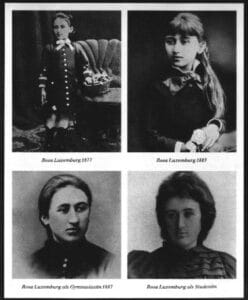
(Kilde Autonominfoservice.net:
https://www.autonominfoservice.net/2009/06/11/rosa-luxemburg-en-politisk-biografi/
Leksikalt mv.
- Rosa Luxemburg – værker på tysk, engelsk og polsk (SFAH, november 2018). “Rosa Luxemburgs samlede udgaver – oversigt udarbejdet af Gerd Callesen.”
- Luxemburg, Rosa. Af Jon Elster (Leksikon.org)
- Rosa Luxemburg (Wikipedia.de). Større tysk Wiki-artikel med links (menu tv.) til biografier på andre sprog, bl.a. til de rimelige danske og engelske artikler, til Luxemburgism, og med mange links til billedsamlinger, artikler, værker og institutioner.
- Biographical Information: ‘Rosa Luxemburg: A socialist with a human face’. By Beverly G. Merrick (Feminist Theory Website; Center for Digital Discourse and Culture, 1998; online at Internet Archive)
Artikler og værker online, af/om RL
På dansk (+ norsk og svensk)
- Rosa Luxemburg (Marxisme Online). Med tekster online på dansk af Luxemburg.
- Tema: Rosa Luxemburg (Socialister.dk). Samling af artikler på dansk og engelsk af og om RL.
- Rosa Luxemburg (1871-1919) (Marxists Internet Archive; Norsk seksjon). Med tekster online af Luxemburg.
- Luxemburg, Rosa (Marxistarkiv.se). Svensk site med værker af og artikler om Rosa Luxemburg.
Rosa Luxemburg: frihed og klassedemokrati. Af Ellen Agerskov (Clarte: tidsskrift for marxistisk analyse, nr.10, 20. februar 2025). “Hvordan Rosa Luxemburg kunne kalde sig demokrat og anse borgerlige frihedsrettigheder for en forudsætning for virkeliggørelsen af det socialistiske demokrati samtidig med at hun kæmpede for proletariatets diktatur.”
Rosa Luxemburg: Et liv for socialisme fra neden. Af Alfred Lang (Autonom Infoservice, 8. januar 2025). “Hun var en af den tyske venstrefløjs mest markante personligheder.” Længere artikel offentliggjort på Modkraft.dk (udgået) og Leksikon.org i 2002. Ajourført for Autonom Infoservice.
Rosa Luxemburgs revolutionære tanker er stadig relevante. Af Michael Löwy (Socialistisk Information, 1. juni 2021). “Hvis man skulle vælge det mest interessante aspekt fra Rosa Luxembourgs liv og værker, så vil man nok vælge hendes revolutionære humanisme. Det handler både om hendes kritik af kapitalismen som et umenneskeligt system, hendes kamp mod militarisme, kolonialisme og imperialisme og om hendes visioner for et frigjort grænseløst samfund uden udbytning og fremmedgørelse.”
Arven fra Engels: Rosa Luxemburg. Af Gerd Callesen (Arbejderen.dk, 4. marts 2021). “Rosa Luxemburg tog den marxistiske teori til sig langt klarere end så mange andre, som ikke forstod, at marxismen var en levende teori. Den skulle anvendes på forholdene, som de eksisterede, ikke som de engang havde været. I år er det 150 år siden, hun blev født.”
Rosa Luxemburg – en levende flamme. Af David Kellaway (Socialistisk Information, 3. juli 2020). Anmeldelse af Paul Le Blanc, The Living Flame – the revolutionary passion of Rosa Luxemburg (Haymarket Books, 2019, 171 p.). “Poul Le Blancs bog er en særdeles læseværdig introduktion for enhver, der ønsker at kende til Rosa Luxemburg og hendes bidrag til revolutionær teori og praksis.”
Kvinders stemmeret og klassekampen. Af Rosa Luxemburg. I: Kvindekamp er klassekamp (Socialistisk Standpunkt, 2010, s.101-106; online på Marxist.dk 26. marts 2019). Tale holdt 12. maj 1912. “Et af de få eksempler på et udtrykkeligt engagement fra hendes side i ‘kvindespørgsmålet’.” (Paul Le Blanc i Socialism or Barbarism. The Selected Writings of ..., Pluto Press, 2010). Findes også i anden oversættelse med titel: “Valgret for kvinder – og klassekamp”. I: Rosa Luxemburg: Mod krig og imperialisme – politiske essays. Red. Stig Hegn (Solidaritet, 2019, s.131-138).
Proletar og kvinde. I Rosa Luxemburg: Mod krig og imperialisme – politiske essays. Red. Stig Hegn (Solidaritet, 2019, s.125-129; online på Vagant.no, 7. marts 2019). Oprindeligt bragt i Sozialdemokratische Korrespondenz, 5. marts 1914. “En verden fuld af kvindelig elendighed venter på at blive befriet, skrev Rosa Luxemburg.”
Rosa Luxemburg – noen sosialistiske stridsspørsmål. Av Ivar Espås Vangen (Radikal Portal, 29. januar 2019). Anmeldelse af Mímir Kristjánsson og Ellen Engelstad: Rosa Luxemburg: en biografi (Forlaget Manifest, 2019, 127 s.). “Rosa Luxemburgs liv og politiske tanker vekkes til live i en ny bok … Flere av de politiske kampene Luxemburg sto i, kan tjene som utgangspunkt for refleksjoner blant sosialister og revolusjonære også i vår tid.”
Sosialisme nedenfra (Vagant.no, 15. januar 2019). “Enquete: Hvilken betydning har Rosa Luxemburg 100 år etter sin død? Vi spurte skandinaver på venstresiden om hva de mener er hennes viktigste innsats, og om hva man kan lære av henne i dagens politiske klima. Hva innebærer tanken om revolusjon i 2019?” Med Sven-Eric Liedman, Per Clausen, Nina Björk mfl.
Derfor skal vi mindes 100-året for Rosa Luxemburgs død. Af Per Clausen (Information.dk, 15. januar 2019). “I dag er det 100 år siden, at den socialistiske tænker Rosa Luxemburg blev myrdet. Hendes historie viser, at det ikke er en forudsætning for at kunne bekæmpe en bestemt form for undertrykkelse, at man selv har været udsat for den.” Se også Niels Jespersen: Per Clausens bizarre hyldest af et »tragisk« tysk kupforsøg (Berlingske.dk, 13. januar 2019) + Per Clausen: Niels Jespersen tager fejl – jeg har ikke hyldet Lenin i Berlin (ibid., 15. januar 2019) + Per Clausen: Rosa – død i 100 år men stadig aktuel (Rød+Grøn, nr.108, februar 2019, s.23).
Rosa Luxemburg og den tyske revolution. Af Marie Frederiksen (Revolution, 15. januar 2019). “Rosa Luxemburg og ledelsen i KPD fremførte behovet for at vinde masserne over til det revolutionære program, men de unge kommunister forstod ikke behovet.”
Rosa Luxemburgs revolutionære arv. Af Jens Riis Bojsen (Socialistisk Arbejderavis, 12. januar 2019; online på Internet Archive). “Rosa Luxemburg har indskrevet sig i historien på tre centrale punkter: Opgør med reformismen – Modstand mod 1. Verdenskrig – Revolution.”
Rosa Luxemburg og den russiske revolution. Af Marie Frederiksen
Rosa Luxemburg – Reform eller Revolution? Af Marie Frederiksen (Revolution, 18. oktober 2018). “Ikke så få gange er hun blevet brugt som symbol på en mere ‘blød’ venstrefløj, som modsætning til Lenin og Bolsjevikkerne. Men det er forkert.”
Om Nina Björks Drömmen om det röda – Rosa Luxemburg (pdf) (Marxistarkiv.se, 8. oktober 2016, 8 s.). Recensioner av Nina Björks bok (Wahlström & Widstrand, 2016, 297 s.).
Dansk udgave: Den røde drøm: Rosa Luxemburg, socialisme, sprog og kærlighed (Solidaritet, 2020, 299 s.). Se anmeldelse af Sophie Schau (Solidaritet.dk, 6. maj 2023).
En revolusjonær forut for sin tid. Av Linn-Elise Øhn Mehlen (Rødt!: Marxistisk Tidsskrift, nr.1, 2016, side 93-94). Anmeldelse af Kate Evans: Red Rosa: A graphic biography of Rosa Luxemburg (Verso Books, 2015, 220 p.). “Kate Evans har laget en spennende, lærerik og annerledes biografi …”
“Rosa Luxemburg i vores tid”. Af Nancy Holmstrom (Socialistisk Information, 22. marts 2016). “Efterlader Rosa Luxemburg en teoretisk og politisk arv til feminister i dag?” P.t. ikke online.
Rosa Luxemburg: en revolutionær der var, er og bliver! Af Marie Frederiksen (Revolution, 26. september 2014). Bragt som forord i Forlaget Marx’ nye genudgivelse af Rosa Luxemburgs “Socialreform eller revolution?”
Nyt lys over Rosa Luxemburg. Af Gerd Callesen (Arbejderen.dk, 3. september 2014). “Et nyt tysksproget bind med Rosa Luxemburgs artikler fra perioden 1893-1906 er udkommet her i foråret.”
Rosa Luxemburg – en ørn. Af Anders Hagström (Socialistisk Information, 12. december 2012/januar 2007). “Rosa Luxemburg er en af den revolutionære arbejderbevægelses største personligheder. Hendes liv var én lang kamp for arbejderklassens frigørelse.”
Arven fra Engels: Rosa Luxemburg. Af Gerd Callesen (Arbejderen.dk, 5. januar 2010). “Rosa Luxemburg tog den marxistiske teori til sig langt klarere end så mange andre, som ikke forstod, at marxismen var en levende teori.”
Det, Rosa mener, er … Af Paul Le Blanc (Solidaritet, nr. 5, november 2010). P.t. ikke online. Artiklen er oversat efter: The challenge of revolutionary democracy in the life and thought of Rosa Luxemburg (MR Online, 14 March 2006). Tale som Le Blanc holdt i Kina på universitetet i Wuhan i marts 2006.
Den dobbeltsidige arv fra Rosa Luxemburg. Af Peter Hudis (Socialistisk Information, nr.187, juni 2004). “Artiklen er et indlæg, som Peter Hudis holdt på et seminar om Rosa Luxemburg i marts 2004.”
“Orden hersker i Berlin”. Af Alfred Lang (Autonom Infoservice, 15. januar 2002). Revideret udgave med ny titel: Rosa Luxemburg: Et liv for socialisme fra neden (14. januar 2023). Længere artikel.
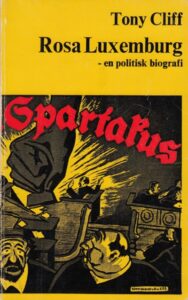
Rosa Luxemburg: en politisk biografi. Af Tony Cliff (Politisk Revy-serien; nr. 7, 1973, 107 sider; online på Marxisme.dk). “I denne biografi er vægten lagt på Luxemburgs politiske virksomhed og hendes vurderinger af de problemer, der rørte sig i tiden omkring 1. verdenskrig og den russiske revolution …”
Se anmeldelse af Jørgen Lund (Proletar!, nr.9, august 1974, s.33-36). “… kun ved at degradere Luxemburg til en stak formuleringer kan hun fremstå som anti-leninismens Jeanne d’Arc. Denne fremstilling har Cliff ingen politisk interesse i …”
Rosa Luxemburg og den revolutionære marxisme. Af Hanne Reintoft (Røde Fane – Teaterprogram, 1970; online på Socialistisk Bibliotek)

In English
Sites:
Rosa Luxemburg (Marxists Internet Archive). With Biography, Works and Critiques of Luxemburg, der indeholder en række marxisters artikler, bl.a. Lenin, Raya Dunayevskaya, Georg Lukacs og Paul Mattick. Norsk Seksjon af sitet har flere artikler af Luxemburg online på norsk end der er online på dansk.
Rosa Luxemburg: Gesammelte Werke (Karl Dietz Verlag, 2007-2017; online på Rosaluxemburgwerke.de). 9 bind, med tekster 1892-1918.
Rosa Luxemburg’s life and legacy (Rosa Luxemburg Stiftung, March 2021). Dossier: “In commemoration of the 150th anniversary of her birth, we ask: what can Luxemburg teach us about economic crisis, gender relations, revolutionary patience, and the struggle for a world beyond capitalism?”
Rosaluxemburgblog: debate, publications and scholarship (site). “… to publicise and share articles, reviews and resources … to build a base for researchers (or anyone) interested in Luxemburg.” Incl. Bibliography and resources. Se også siden på Facebook.
Articles:
Rosa Luxemburg’s war against cynicism. By Sean Larson (Tempest, December 22, 2024). Review of The Complete Works of Rosa Luxemburg, Vol. V: Political Writings 3, On Revolution: 1910-1919. Eds. Paul Le Blanc and Helen C. Scott (Verso, 2024, 512 p.). “Reading Rosa Luxemburg at the height of her powers is like bearing witness to a prophet at work, filled to the brim with a crackling energy, as she illuminates the path to liberation by the light of her searing words.”
See also:
Rosa Luxemburg and the democratic road to socialist revolution (Tempest, June 10, 2024). “John Marot explains how Luxemburg’s ideas of revolutionary democracy developed in light of the German Revolution.”
Luxemburg on the Russian Revolution: A correction (Tempest, July 30, 2024). “John Marot argued that Rosa Luxemburg’s views of soviet democracy began to converge with Lenin’s in the months just before her murder—particularly in light of her participation in the German Revolution. Here Helen C. Scott and Paul Le Blanc take issue with the way they are quoted in Marot’s piece.”
Luxemburg’s lessons and the roots of Stalinism: A reply to Helen Scott and Paul Le Blanc. By John Marot (Tempest, August 28, 2024)
Lenin, Luxemburg, and the revolutionary tradition: A clarification and a response. By Helen Scott and Paul LeBlanc (Tempest, September 10, 2024).
Rosa Luxemburg: The Incendiary Spark. By Elaine Graham-Leigh (Counterfire, 5 September 2024). Review of Michel Löwy, Rosa Luxemburg: The Incendiary Spark, edited by Paul Le Blanc (Haymarket Books, 2024, 190 p.): “A collection of essays by Michel Löwy on Rosa Luxemburg, drawn from writing over many decades, provokes stimulating debates.”
See also William Smaldone: Rosa, Spark of Revolution (Against the Current, Issue 234, January-February 2025) + Peter Hudis: We’re still learning from Rosa Luxemburg (Jacobin, March 31, 2025).
Rosa Luxemburg and the democratic road to socialist revolution (Tempest, June 10, 2024). About The Complete Works of Rosa Luxemburg, Vol. V: Political Writings 3, On Revolution: 1910-1919. Eds. Paul Le Blanc and Helen C. Scott (Verso, 2024, 512 p.). “John Marot explains how Luxemburg’s ideas of revolutionary democracy developed in light of the German Revolution.”
See also:
Luxemburg on the Russian Revolution: A correction (Tempest, July 30, 2024). “John Marot argued that Rosa Luxemburg’s views of soviet democracy began to converge with Lenin’s in the months just before her murder—particularly in light of her participation in the German Revolution. Here Helen C. Scott and Paul Le Blanc take issue with the way they are quoted in Marot’s piece.”
Luxemburg’s lessons and the roots of Stalinism: A reply to Helen Scott and Paul Le Blanc. By John Marot (Tempest, August 28, 2024)
Lenin, Luxemburg, and the revolutionary tradition: A clarification and a response. By Helen Scott and Paul LeBlanc (Tempest, September 10, 2024)
Spontaneity, strikes and socialism: rereading Rosa Luxemburg. By Charlie Kimber (International Socialism, Issue 181, Winter 2024, p.149-165). Review of The Complete Works of Rosa Luxemburg, Volume 3: Political Writings 1, On Revolution 1897-1905, Eds. Peter Hudis, Axel Fair-Schulz and William A Pelz (Verso, 2022, 592 p.) and The Complete Works of Rosa Luxemburg, Volume 4: Political Writings 2, On Revolution: 1906-09, Eds. Peter Hudis and Sandra Rein (Verso, 2022, 576 p.).
Rosa Luxemburg anticipated the destructive impact of capitalist globalization. By Peter Hudis (Jacobin, July 29, 2023). “Rosa Luxemburg’s work The Accumulation of Capital described the havoc that capitalism wreaked upon what we now call the Global South. Today’s socialist and environmental activists can draw valuable insights from Luxemburg’s understanding of the world system.”
Rosa Luxemburg was the great theorist of democratic revolution. By Peter Hudis (Jacobin, August 26, 2022). About the The Complete Works of Rosa Luxemburg, Vol. IV: Political Writings 2, On Revolution: 1906–1909. Ed. Peter Hudis (Verso, 2022, 576 p.). “A new edition of Rosa Luxemburg’s writings, most of which have never appeared in English before, gives us a unique perspective on her thought. Luxemburg believed that a socialist revolution would have to be democratic or else it would be doomed to failure.”
See also interview with Peter Hudis: Rosa Luxemburg, Work in Progress (Verso, Blog, 4 March 2021) + review by Jared Marcel Pollen: How the 1905 Revolution inspired Rosa Luxemburg’s vision of emancipation (Jacobin, September 4, 2022) + review by Robert Ovetz: Revisiting Rosa Luxemburg’s Writings on the 1905 Russian Revolution (New Politics, Issue 75, Summer 2023) + review by John Marot: Rosa Luxemburg’s Bolshevism (Against the Current, Issue 234, January-February 2025).
Post Rosa: Letters Against Barbarism. By Dominic Alexander (Counterfire, August 4, 2022). Review of Hjalmar Jorge Joffre-Eichhorn’s (eds.) book (Rosa Luxemburg Stiftung, 2021, 325 p.). “The structure consists of ten sets of exchanges of letters between socialists in different parts of the world, and each of these vary widely in topic and tone.”
The Complete Rosa Luxemburg (Against the Current, Issue 218, May-June 2022). William Smaldone interviews Peter Hudis, the general editor of the complete works of Rosa Luxemburg: “Putting together a complete collection of all of her writing has never been done before. And you realize she wrote in three different languages: German, Polish and Russian. It means collecting all that material and translating it; at least eighty percent of this material has never been available in English.”
Rosa Luxemburg and the Bolsheviks: dispelling the myths. By Fred Weston and Parson Young (In Defence of Marxism, 10 January 2022). “This great revolutionary martyr has often been misrepresented as an opponent of the October Revolution, and as standing for some sort of ‘softer’, ‘anti-authoritarian’ Marxism as against that of Lenin and the Bolsheviks.”
Either-Or: Rosa Luxemburg and Internationalism. By Michael Löwy (New Politics, Issue 71, Summer 2021). “An exploration of Luxemburg’s proletarian internationalism and its lessons for today.”
Capturing “the spirit of struggle”: Rosa Luxemburg on Literature. By Helen Scott (New Politics, Issue 71, Summer 2021). “Rosa Luxemburg has been the subject of numerous works of literary fiction in the century since her death, including Karl and Rosa, the final book of Alfred Döblin’s multivolume November 1918: A German Revolution (1950); Rosa, the first in Jonathan Rabb’s Berlin trilogy (2005); and Kate Evans’ graphic novel Red Rosa (2015).”
Happy 150th birthday, Rosa Luxemburg. By Marcello Musto (Jacobin, March 5, 2021). “One hundred and fifty years ago today, the Polish Marxist thinker and organizer Rosa Luxemburg was born. She is, without question, one of the towering figures in the entire history of the socialist movement.”
How Rosa Luxemburg taught worker-militants to think differently. By Julia Damphouse (Jacobin, March 5, 2021). “150 years since her birth, Rosa Luxemburg is often remembered more as a martyr than a theorist. But as a teacher at a socialist party school she taught worker-militants to see the world like a Marxist — nurturing the intellectual tools that would let them master their own fate.”
150 years since the birth of Rosa Luxemburg. By Peter Schwarz (World Socialist Web Site, 4 March 2021). “Rosa Luxemburg, who was born on 5 March, 1871, was among the most important revolutionary Marxists of the 20th century, and her work contains vital lessons for today.”
Rosa Luxemburg — reform is not enough (Socialist Worker, Issue 2744, 27 February 2021). “Rosa Luxemburg, born 150 years ago, fought reformist ideas to argue for revolution. Isabel Ringrose looks at what her economic writings contributed to Marxist ideas.”
The Living Flame: The Revolutionary Passion of Rosa Luxemburg. By Orlando Hill (Counterfire, November 5, 2020). Review of Paul Le Blanc’s book (Haymarket Books, 2019, 171 p.). “The book is a collection of essays, a book review, and an interview … [it] shows the importance of keeping Luxemburg’s ideas of revolutionary democracy alive.”. See also review by David Kellaway (Socialist Resistance, 3 June 2020) + review by Kaitlin Peters (Marx & Philosophy Review of Books, 11 November 2020).
Join Rosa Luxemburg’s march. By Martin Thomas (Workers’ Liberty, 28 August, 2020). Review of Dana Mills, Rosa Luxemburg (Reaktion Books, 2020, 224 p.) (Critical Lives). “In these days when NGO politics so looms over the left, the recall to the spirit and approach of an activist from the heroic days of the Marxist movement is refreshing. The biography isn’t as happy, I think, in locating Luxemburg within that movement.” See also review by William Smaldone (Marx & Philosophy Review of Books, 7 June 2021) and a longer interview with Dana Mills: The best brain after Marx (Counterfire, 5 March 2021).
Rosa Luxemburg and the final conflict: Socialism or barbarism … now? (Spectre, April 24, 2020). “Paul LeBlanc reflects on the relevance of Rosa Luxemburg’s legacy today.”
Rosa Luxemburg on 1905. By Martin Thomas (Solidarity & Workers’ Liberty, Issue 516, 11 September 2019). Review of The Complete Works of Rosa Luxemburg, Vol. III: Political Writings 1. On Revolution: 1897–1905. Ed. Peter Hudis (Verso, 2019, 592 p.). “The volume is largely a collection of Luxemburg’s day-to-day reports and comments on the revolution in the Tsarist empire in 1905 …” See also review by Sevgi Doğan (Marx & Philosophy Review of Books, 29 June 2020) + John Molyneux: Falling in love again (Irish Marxist Review, Vol.10, No. 29, 2021, p.92-95) + interview with Peter Hudis: Rosa Luxemburg, work in progress (Verso, 4 March 2021).
Rosa Luxemburg Symposium (New Politics, Issue 67, Summer 2019). “In honor of the centenary of her murder, a symposium on Rosa Luxemburg’s legacy was organized by the Will Miller Social Justice Lecture Series at the University of Vermont. The following three articles are based on lectures at that symposium.“:
- Helen Scott: Rosa Luxemburg: A revolutionary life
- Nancy Holmstrom: Rosa Luxemburgs legacy for feminism
- Alyssa Adamson: Rosa Luxemburg and the necessity of Anti-imperialism for revolutionary Socialism
On Rosa Luxemburg and her murder. By Jason Schulman (Against the Current, Issue 200, May-June 2019). “We should continue to read Rosa not because she provides a ready-made model of revolutionary strategy to be emulated, not because she has all the answers to Marxism’s current dilemma … but because her democratic, internationalist, antimilitarist, anti-opportunist, and emancipatory socialist principles are the right principles.”
Middle school students ask about Rosa Luxemburg (SocialistWorker.org, February 1, 2019). “Middle school students doing a history project about the Polish-born revolutionary Rosa Luxemburg asked socialist Paul Le Blanc six questions about her life.”
Rosa Luxemburg and imperialism. By Martin Thomas (Solidarity & Workers’ Liberty, Issue 492, 23 January 2019). “Rosa Luxemburg considered her most important contribution to be her book, The Accumulation of Capital, published in 1913.”
‘I was, I am, I will be’ – 100 years after the death of Rosa Luxemburg (RS21: Revolutionary Socialism in the 21st Century, 15 January 2019). “Joe Sabatini reviews … Klaus Gietinger’s The Murder of Rosa Luxemburg, as well as providing an introduction to some of the literary works inspired by the events of 16 January 1919.”
Rosa Luxemburg’s revolutionary Socialism (SocialistWorker.org, January 15, 2019). “One hundred years ago today, one of the most important figures in the history of the socialist movement was murdered by a far-right death squad along with her comrade Karl Liebknecht. Veteran socialist Paul Le Blanc tells her story and explains her contributions.”
One, two, many Rosa Luxemburgs. By Ines Schwerdtner (Jacobin, January 15, 2019). “On the 100th anniversary of her murder, Rosa Luxemburg’s incredible life provides us with a model — not necessarily of what to do, but of how to do it.”
“They were openly calling for murder” (Verso, Blog, 15 January 2019). “On the 100th anniversary of the murder of Rosa Luxemburg and Karl Liebknecht, Klaus Gietinger is interviewed about the events that lead up to the murders, and who was responsible for them.”
From Reform to Revolution. By Lea Ypi (Jacobin, January 15, 2019). “Rosa Luxemburg saw the fight for social reform as a vital means of mobilizing the oppressed. Yet only revolutionary transformation could make their victories permanent.”
Luxemburg, Liebknecht and the German Revolution (In Defence of Marxism, 15 January 2019). “Marie Frederiksen explains how the Spartacist Uprising of 1919 was defeated due to the weakness and mistakes of the young German Communist Party, ultimately resulting in Luxemburg’s execution.”
Rosa Luxemburg: a revolutionary for our times. By Dana Mills (Counterfire, January 15, 2019). “Rosa’s commitment to her class against the greatest of odds is an enduring inspiration.”
Celebrating Rosa Luxemburg (Socialist Review, Issue 442, January 2019). “A remarkable figure amid a revolutionary ferment, Rosa Luxemburg lit the way for generations to come. Sally Campbell recalls her legacy, and we reprint Luxemburg’s final article, written the day before she died in January 1919.”
The Rosa Luxemburg myth: A critique of Luxemburg’s politics in Poland (1893–1919) (pdf). By Eric Blanc (Historical Materialism, Vol.25, No.4, 2017, p.3-36; online at Workers Liberty). “By examining the politics and practices of Luxemburg and her SDKPiL party in Poland, I show that their commitment to proletarian emancipation was undermined by sectarian and doctrinaire tendencies that contributed to the defeat of Poland’s workers’ revolutions in 1905 and 1918–19.” See excerpt: Part 1-3 (Marxists Essays and Commentary, February 1 – February 22, 2018).
Secular stagnation and Rosa Luxemburg’s breakdown theory. By Barry Finger (New Politics: A Journal of Socialist Thought, Issue 61, Summer 2016). Review of The Complete Works of Rosa Luxemburg, Vol.I-II, Economic Writings 1-2. Ed. Peter Hudis (Verso, 2014/2015). “The editors of these volumes have provided an invaluable service, bringing renewed attention to the highly original and enduringly contentious critique of Capital …”. See also review by Martin Thomas: Luxemburg, economics, crises, and the national question (Workers’ Liberty, 30 August, 2018).
‘The hammer blow of the Revolution’: Rosa Luxemburg’s critique of bourgeois democracy. By Michael Löwy (New Politics: A Journal of Socialist Thought, Issue 61, Summer 2016). “Less well known and often forgotten is her critique of bourgeois democracy, its limits, its contradictions, and its narrow and partial character.”
Rosa Luxemburg for our time. By Nancy Holmstrom (Against the Current, Issue 181, March-April 2016). “Does Rosa Luxemburg leave feminists a theoretical and political legacy?”
Red Rosa takes another genre. By Paul Le Blanc (SocialistWorker.org, November 9, 2015). Review of Kate Evans, Red Rosa: A Graphic Biography of Rosa Luxemburg, ed. by Paul Buhle (Verso, 2015, 224 p.). See also interview with Paul Buhle: Rosa lives (Jacobin, January 29, 2016) + anmeldelse af Linn-Elise Øhn Mehlen: En revolusjonær forut for sin tid. Av Linn-Elise Øhn Mehlen (Rødt!/Gnist, nr.1, 2016, s.93-94)
Rosa Luxemburg: Economics for a new socialist project. By Ingo Schmidt (New Politics, Issue 57, Summer 2014). “Leftists interested in Luxemburg’s work looked at her politics but had little time for economics.”
“I was, I am, and I will be”: Reconsidering Rosa Luxemburg for the 21st Century. By Axel Fair-Schulz (Logos, Vol.13, No.1-2, Spring 2014). “Seriously reading Luxemburg’s today, either for the first time or even years after one’s first encounter, is an exceedingly enriching experience.”
The dialectic of the spatial determination of Capital: Rosa Luxemburg’s Accumulation of Capital reconsidered. By Peter Hudis (Logos: A Journal of Modern Society and Culture, Vol.13, No.1-2, Spring 2014). “Now that a new English translation of the Accumulation of Capital is being prepared … this is a fitting moment to re-examine how her theory of capitalist accumulation speaks to today’s urgent need to reverse capital’s global drive to undermine the ecological as well as economic and social viability of human existence itself.”
Rosa Luxemburg – a revolutionary for our time, or a liberal? By Ingo Schmidt (New Politics, April 29, 2014). Review of Jason Schulman (ed.), Rosa Luxemburg: Her Life and Legacy (Palgrave Macmillan, 2013, 214 p.)
Theme: Rosa Luxemburg’s concept of crisis in contemporary thoeretical context (Critique: Journal of Socialist Theory, Vol.40, No.3, 2012, p.309-464). Only firstpage preview online. With articles by Hillel Ticktin, Peter Hudis, Ingo Schmidt, Ottokar Luban, Alex Levant, Donny Gluckstein, Christos Memos, Michael Kasprzak, Ben Fine and Michael Löwy.
Rosa Luxemburg: In the storm of struggle. By Helen Scott (International Socialist Review, Issue 81, January-February 2012). Review article of The Letters of Rosa Luxemburg, edited by Georg Adler, Peter Hudis and Annelies Laschitza (Verso, 2011, 656 p.). “The first installment of a valuable ongoing endeavor to publish all her collected works in English; it makes available a wealth of letters, including many that were not previously available in English.” See also review by Paul le Blanc: Revolutionary letters (SocialistWorker.org, March 23, 2011).
Special Section: Rosa Luxemburg’s political economy: contributions to contemporary political theory and practice (Socialist Studies, Vol.6, No.2, Fall 2010, p.38-172). “We are fortunate to have several of the foremost Luxemburg scholars today contributing analyses, with each author tackling different aspects of Luxemburg’s rich legacy, including theories of capitalist crisis, colonization, feminism, imperialism and war …” With articles by Elaine Coburn, Klaus Dörre, Peter Hudis, Ingo Schmidt, Helen C Scott, Estrella Trincado and Paul Le Blanc.
Rosa Luxemburg and Communism. By Michael Löwy (Actual Marx, No. 48, 2010, p.22-32; online at Cairn.info/Internet Archive). “There are four topics in Rosa Luxemburg’s writings that are of particular importance from the perspective of a renewal of communism in the twenty-first century: internationalism, an ‘open’ conception of history, the importance of democracy in the revolutionary process, and an interest in ‘premodern’ communist traditions.”
The Rosa Luxemburg Reader. Edited by Peter Hudis and Kevin B Anderson (Monthly Review Press, 2004, 432 p.). Review by Kanishka Chowdhury (pdf) (Science & Society, Vol. 71, No. 1, October 2007, p.133-136). “Unlike previous publications of her work from the early 1970s, this volume includes substantial extracts from her major economic writings … and from her political writings … The Reader also includes a number of important texts that have never before been published in English translation.” See the book online at Academia.edu.
Rosa at a loss: the KPD leadership and the Berlin uprising of January 1919 – legend and reality. By Ottokar Luban (Revolutionary History, Vol.8, No.4, 2004, p.19-45; online at Workerscontrol.net). “In my opinion, Rosa Luxemburg’s balance sheet of the January uprising is one of self-deception, helplessness and a flight into an almost completely determinist historical picture, bereft of any hint of self-critical analysis.” Svensk udgave: Rådlösa Rosa (pdf) (Marxistarkiv.se, 20 s.).
The revolutionary orientation of Rosa Luxemburg. By Paul Le Blanc (Europe solidaire sans frontiéres, 21 May 2004). “Rosa Luxemburg was a brilliant theorist … But she was committed not only to understanding the world but also to changing it. I want to concentrate here on her thinking about how to do this.”
Can capitalism go on forever? By Judy Cox (International Socialism, Issue 100, Autumn 2003, p.133-146). Review of Rosa Luxemburg, The Accumulation of Capital (Routledge, 2003). “Luxemburg’s book, though flawed, is a major contribution to Marxism for several reasons.”
Rosa Luxemburg was a revolutionary socialist (Counterfire, January 14, 2019). “Written in 1983, Lindsey German’s introduction to Tony Cliff’s book on Rosa Luxemburg gives a brief snapshot of her revolutionary life and ideas.”
Rosa Luxemburg’s revolutionary life. By Raya Dunayevskaya (News & Letters, January-February 2019). “To highlight how Luxemburg’s revolutionary life and thought are pertinent today, we present a critical review by Raya Dunayevskaya of The Letters of Rosa Luxemburg, edited and with an Introduction by Stephen Eric Bronner (Westview Press, 1978). The review originally appeared in the August-September 1979 issue of News & Letters …”
Rosa Luxemburg in retrospect. By Paul Mattick (Root and Branch, Issue 6, 1978; online at Marxists Internet Archive). Svensk udgave på Marxistarkiv.se (pdf). “She was the outstanding personality in the international labor movement after Marx and Engels; and that her work has not lost its political relevance despite the changes the capitalist system and the labor movement have undergone since her death.”
Rosa Luxemburg and political economy. By Ernest Mandel (IIRE: International Institute for Research and Education, 12 July 2020). “In this article, originally published as the preface to Luxemburg’s ‘Introduction à l’economie politique’ [1978], Mandel surveys Rosa Luxemburg’s contributions to political economy.”
Rosa Luxemburg as feminist. By Raya Dunayevskaya (News & Letters, March-April 2018). “Excerpts from ‘Luxemburg as Feminist; Break with Jogiches’, Chapter 7 of Rosa Luxemburg, Women’s Liberation, and Marx’s Philosophy of Revolution (1978), by Raya Dunayevskaya.”
Rosa Luxemburg after 1905. By Norman Geras (New Left Review, Issue 89, January-February 1975, p.3-46; online at Marxist Update). “The present article documents, and tries to resolve, the deep confusion which exists concerning Luxemburg’s attitude toward the Russian revolution in the period before 1917.”
Rosa Luxemburg: Barbarism and the collapse of Capitalism. By Norman Geras (New Left Review, Issue 82, November-December 1973, p.17-38; online at Marxist Update). “Amongst the misconceptions by which Rosa Luxemburg’s thought has been deformed, the most widespread and tenacious is, without doubt, that which attributes to her a thesis going variously under the names of determinism, fatalism and spontaneism.”
Rosa Luxemburg and German Social Democracy. By Ernest Mandel (Socialist Action, 1971). “The real place of Rosa Luxemburg has still to be located precisely in the history of the revolutionary movement.”
“Introduction”. In: Rosa Luxemburg Speaks (pdf). Edited with an introduction by Mary-Alice Waters (Pathfinder Press, 1970, p.1-32; online at Academia.edu). Scroll down.
Rosa Luxemburg. Vol.1-2. By J.P. Nettl (Oxford University Press, 1966). Vol. 1 (1871-1911, 450 p.; online at Monoskop.org). The 1969 edition is abridged. See reviews:
- Luxemburg and Lenin. By Jim Higgins (International Socialism, No.27, Winter 1966/67; online at Marxists Internet Archive). “Nettl has carried out a useful and long overdue service. The research involved has been monumental …”
- Rosa Luxemburg by J.P. Nettl. By Paul Mattick (Science & Society, Vol.31, No.1, 1967, p.108-114; online at Marxists Internet Archive). “The fundamental difference between Lenin and Luxemburg is aptly summed up by Nettl.”
- “A heroine of revolution”. By Hannah Arendt (The New York Review of Books, Vol.7, No.5, October 1966; online with the title Rosa Luxemburg 1871-1919 at DEP, No.6, 2015, scroll down to p.137-151). “Mr. Nettl is right: Her ideas belong wherever the history of political ideas is seriously taught.”
- The many interpretations of Rosa Luxemburg’s legacy’ (Verso, Blog, 14 January 2019). An excerpt from J.P. Nettl’s introduction in the re-issued biography of Rosa Luxemburg.
Rosa Luxemburg. By Tony Cliff (International Socialism, No.2-3, 1959; online at Marxists Internet Archive). “This pamphlet concentrates mainly on Rosa Luxemburg’s ideas, as they contain her main permanent contribution to the international socialist movement.”
Lenin and Rosa Luxemburg. By Max Shachtman (The New International, Vol.4, No.5, May 1938, p.141–144; online at Marxists Internet Archive). “Two Legends have been created about the relationship between the views of Lenin and Rosa Luxemburg. Despite their antagonistic origins and aims, they supplement each other in effect.” See also Lenin and Rosa Luxemburg (Ibid., Vol.2, No.2, March 1935, p.60-64). ”

Litteratur på dansk
Om Rosa Luxemburg:
Se om Paul Frölichs biografiske hovedværk: Rosa Luxemburg – idé og handling (Solidaritet, 2010). Se øverst på denne side.
Marie Frederiksen: Rosa Luxemburgs revolutionære arv (Forlaget Marx, 2019, 294 sider). Se Indledning (Revolution, 15. januar 2019). English edition: The Revolutionary Legacy of Rosa Luxemburg (Wellred Books, 2022, 320 p.). See video with Marie Frederiksen (39:08 min.).
Per Clausen: Rosa Luxemburg (Solidaritet, 2015, 68 sider).
Toni Liversage: Røde Rosa: en bog om Rosa Luxemburg (Vindrose, 1994, 157 sider).
Christel Neusüss: “Rosa Luxemburg” (Politisk Revy, årg. 20, nr. 440, 1983, side 16-17).
Ditte Cederstrand: Revolutionens ørn: 13 billeder af Rosa Luxemburgs liv (Medusa, 1979, 103 sider) (Arbejderlitteratur; Socialistisk Kulturfront). “Dramatiserede scener fra hendes liv.”
Tony Cliff: Rosa Luxemburg: en politisk biografi (Politisk Revy, 1973, 107 sider; Politisk revy-serien nr. 7). Anmeldelse af Jørgen Lund (Proletar! nr. 9, august 1974, side 33-36).
H.-L. Evermann: “Rosa Luxemburgs kritik af den russiske revolution” (Dansk Udsyn, årg. 51, nr. 2, 1971, side 103-114). Bl.a. analyse af to tolkningsforsøg: György Lukács og Günter Radczun.
Hanne Reintoft: “Rosa Luxemburg”. I: Socialreform eller revolution? Red. Hanne Reintoft (Gyldendal, 1969, side 9-25).
Af Rosa Luxemburg:
Mod krig og imperialisme – politiske essays. Red. og oversat af Stig Hegn (Solidaritet, 2019, 161 sider). Forord af Peter Hudis: Luxemburgs dobbelte arv (side 7-17; se Peter Hudis in English.*). Efterskrift af Judy Cox: Kan kapitalismen fortsætte i al evighed (side 139-157; se Judy Cox in English). Samling af artikler af RL fra tiden omkring og imod Første Verdenskrig.
* Med titlen Den dobbeltsidige arv fra Rosa Luxemburg har Hudis’ indlæg tidligere været bragt i forkortet anden oversættelse (Socialistisk Information, nr. 187, 2004; se ovenfor i afsnit ‘Artikler og værker online, af/om RL’).
Politiske skrifter: et udvalg (Tiderne skifter, 1976, 320 sider).
Oversat og kommenteret af Toni Liversage, med En introduktion, side 11-86.
Rosa Luxemburg: Kapitalens akkumulation: et bidrag til den økonomiske forklaring på imperialismen (Rhodos, 1976, 450 sider). Bogen indeholder også skriftet Kapitalens akkumulation eller hvad epigonerne har lavet ud af den marxske teori. En Antikritik (1915), side 351-437.
[Kapitalens] Andet og tredje bind (1918). I: Franz Mehring: Karl Marx: Hans livs historie (Rhodos, 1976. Bind 2, side 408-18).
Socialreform eller revolution? (Gyldendal, 1969, 128 sider). Oversat og redigeret af Hanne Reintoft, med biografi side 9-25, og introduktion side 26-42. RL’s tekst herfra er genudgivet af Internationale Socialisters Forlag (1997, 64 sider), med indledning af Donny Gluckstein, side 5-15. Samme oversættelse er udgivet af Forlaget Marx (2014, 80 sider), med forord af Marie Frederiksen (side 9-16).
Breve fra fængslet (Tiden, 1949, 62 sider). Breve til Sophie Liebknecht. “Revideret genoptryk” 1985 (Idons forlag, 74 sider).
Nyoversættelse af Stig Hegn + cd/lydbog, indlæst af Karin Hegelund (Solidaritet, 2013, 116 sider).
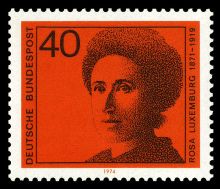
Et omdiskuteret (vest)tysk frimærke fra 1974. Se: Rosa Luxemburg-Wikipedia-artiklen: Politische Wirkungen; nach 1945
“… det vakte stor opmærksomhed og mange protester. Den bayerske forfatningsdomstol undersøgte om man kunne standse mærket. Industri- og Handelskammeret i Weisbaden nægtede at modtage et brev frankeret med et gyldigt Luxemburg-frimærke, rygter om at en postfunktionær i Kissleg havde afbrændt posthusets beholdning af disse mærker.”
(Kilde: Billedtekst af Stig Hegn, i Paul Frölich: Rosa Luxemburg – ide og handling (Solidaritet, 2010, side 95).
Se også:
Rosa Luxemburg Stiftung: Gesellschaftsanalyse und politische Bildung e. V. Berlin (site).
The origin of Rosa Luxemburg’s slogan ‘socialism or barbarism’. By Ian Angus (Climate and Capitalism, October 22, 2014)
Røde Rosa (Arbejdermuseet). “Hvordan får vi egentlig noget at vide om fortiden? Vær med, når vi går på jagt i arkivet efter spor af historien om den berømte socialist Rosa Luxemburgs besøg i København i 1910.”
Se også på Socialistisk Bibliotek:
- Teksten: Røde Fane – Teaterprogram: “Orden hersker i Berlin”. Program for Fiolteatrets stykke: “Orden hersker i Berlin”, oktober 1970, 8 A4-sider. Med artikler af bl.a. Claus Bryld og Hanne Reintoft.
- Tidslinjen: 4.-8. april 1899 om udgivelsen af Socialreform eller revolution.
- Tidslinjen: marts 1902 om RLs kritik af Lenins ‘Hvad må der gøres’ etc.
- Tidslinjen: 16. september 1906 om udgivelsen af Massestrejke, parti og fagforeninger.
- Tidslinjen: 13. august 1871 om Karl Liebknecht.
- Tidslinjen: 7. august 1884 om Paul Frölich.
- Tidslinjen: 15. januar 1919, Rosa Luxemburg og Karl Liebknecht myrdes.
- Tidslinjen: 27. november 1953 om Emil Bønnelycke’s Luxemburg-digt og -oplæsning (afsluttedes m. revolveskud) 4. februar 1919.
- Linkboxen: Den tyske revolution 1918-1923
- Emnelisten: Liebknecht-Luxemburg-demoer i januar i Berlin
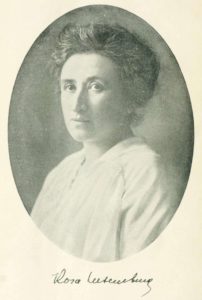
Film/video
Die Geduld Der Rosa Luxemburg (1986) (YouTube. Deutsche Text (1:54:37 hours).
Rosa Luxemburg (film) (Wikipedia.org)
Rosa Luxemburg, von Trotta’s 1986 film, receives digital restoration. By Tom Griffiths (Counterfire, January 21, 2019). “In this moving biopic, Rosa Luxemburg emerges as a vibrant, sensual, intellectually brilliant, morally and physically courageous woman, whose legacy proves timeless.” See also review by Sally Campbell (Socialist Review, Issue 443, February 2019; online at Internet Archive)
Audio: In Our Time: Rosa Luxemburg. Melvyn Bragg discusses the life and times of Rosa Luxemburg (with Jacqueline Rose, Mark Jones & Nadine Rossol) (BBC, Player Radio, 13 April 2017, 43 min.)
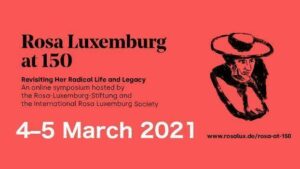
Rosa Luxemburg at 150: Revisiting her radical life and legacy.
Event 4.-5. March 2021 by the Rosa-Luxemburg-Stiftung and the Internationale Rosa-Luxemburg-Gesellschaft. Conference live on our Facebook page: In spite of everything and anything: A celebration of Rosa Luxemburg’s 150th birthday.
Understanding Rosa Luxemburg’s life and work (Verso Books/YouTube, 5 March 2021, 22:10 min.). “An interview with Peter Hudis, editor of the Complete Works of Rosa Luxemburg, in cooperation with the Rosa-Luxemburg-Stiftung.”
